Wales to become a ‘global player’ in cancer treatment as pioneering centre opens offering proton beam that saved Ashya King to NHS patients
- The first UK centre using the method was officially opened today
- Rutherford Cancer Centre has been treating cancer patients since April 2018
- Ryan Scott, 23, is the first NHS Wales patient to be treated at the private clinic
- Schoolboy Ashya King was saved by the treatment in Prague sparking interest
- NHS is funding more centres – but it will only help a small number of cases
Wales is to become a leading player for offering a pioneering cancer treatment, according to health officials.
Private clinic The Rutherford Centre in Newport, South Wales, has treated its first NHS patient with proton beam therapy.
Ryan Scott, 23, of Cardigan, West Wales, who has a brain tumour, was told he would no longer need to fly to the US for the treatment and could have it right on his doorstep.
Proton beam therapy (PBT) gained huge attention in 2014 when the parents of Ashya King, who was then five, were jailed for abduction after removing Ashya from hospital to receive the treatment in Spain.
The NHS have been building centres to fund people in the UK – but experts warn it will be a long time before significant numbers will be treated.

Proton beam therapy famously treated Ashya King, pictured in 2018. In 2014 his parents, Brett and Naghmeh King, were jailed with abduction when they took Ashya out of hospital to receive the treatment abroad
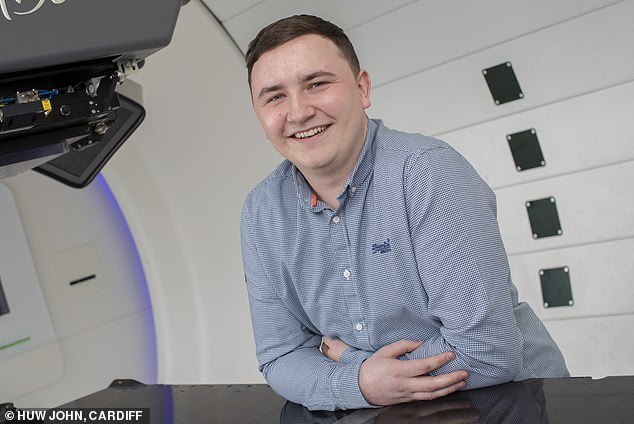
Ryan Scott, 23, of Cardiff, is the first NHS patient to have been treated with proton beam therapy at private clinic The Rutherford Centre in Newport, South Wales
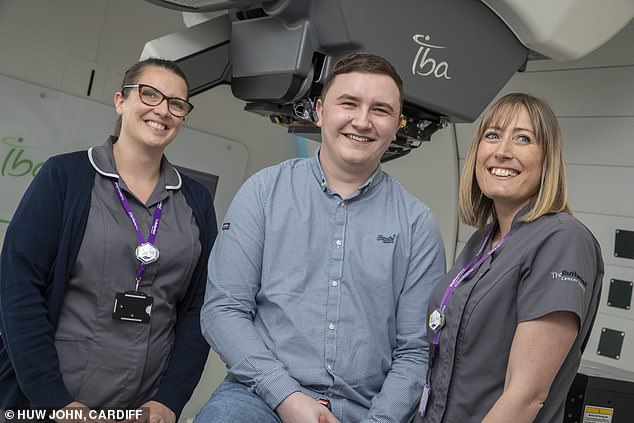
Mr Scott, pictured with staff at the centre, was getting ready to travel to the US for proton beam therapy for a brain tumour before being told he could have it in his home of Wales
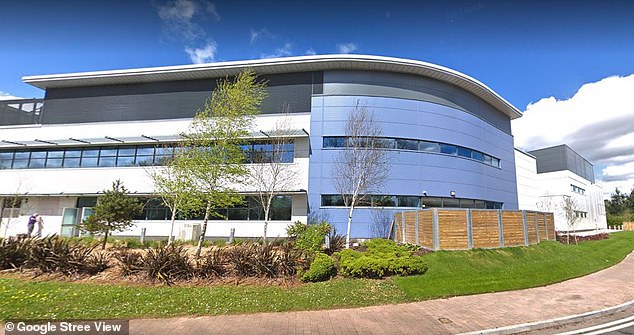
In December 2018, NHS Wales struck a deal that would see adult NHS Wales patients who need PBT treated at the Rutherford Cancer Centre
PBT allows a dose of high energy protons to be precisely targeted at a tumour, reducing the damage to surrounding healthy tissue.
It is beneficial for patients where the cancer is close to a critical part of the body such as the spinal cord or brain.
Mr Scott had a grade 1 cranio pharyngioma and was about to receive PBT for it in the US – it has been accessible abroad to about 1,000 eligble NHS patients since 2008.
But, in December 2018, NHS Wales struck a deal that would see adult NHS Wales patients who need PBT treated at the Rutherford Cancer Centre.
Mr Scott was the first patient and said: ‘I was very pleased when my consultant recommended proton beam therapy and told me that it was available close to home in South Wales.
‘I was due to be treated with proton beam therapy over the course of eight weeks in the US, a disruption I was not looking forward to.
‘Happily, however, the agreement between NHS Wales and the Rutherford Cancer Centres was struck just in time for me to be treated a short drive from home.
‘The process of undergoing proton beam therapy was much better than anticipated. There have been hardly any side effects and being able to sleep in my bed after a day’s treatment is a real plus.’
The centre treated the first patient in the UK with PBT in April last year, Simon Hardacre, 56, a company director from Woolaston in Gloucestershire.
Since then, the centre has treated 25 patients.
Today, Vaughan Gething, Minister for Health and Social Services, hosted an official opening as a celebration of its progress.
Mr Gething said: ‘I am delighted to officially open the Rutherford Cancer Centre in Newport today. It was the first facility in the UK to offer proton beam therapy for cancer patients, and an excellent example of the development of new cancer therapies, here in Wales.
‘It’s a perfect illustration of how we are working collaboratively to deliver technological innovations to improve treatment for patients’.
Andrew Goodall, chief executive of NHS Wales, and Mike Moran, chief executive of Proton Partners International which operates the Rutherford Cancer Centres, also attended today’s official opening.
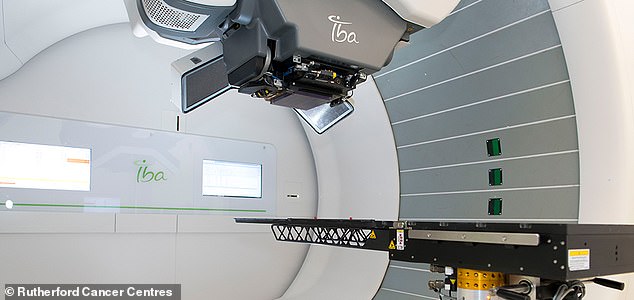
The centre treated the first patient in the UK with PBT in April last year but was officially opened today, April 9. Pictured, the equipment
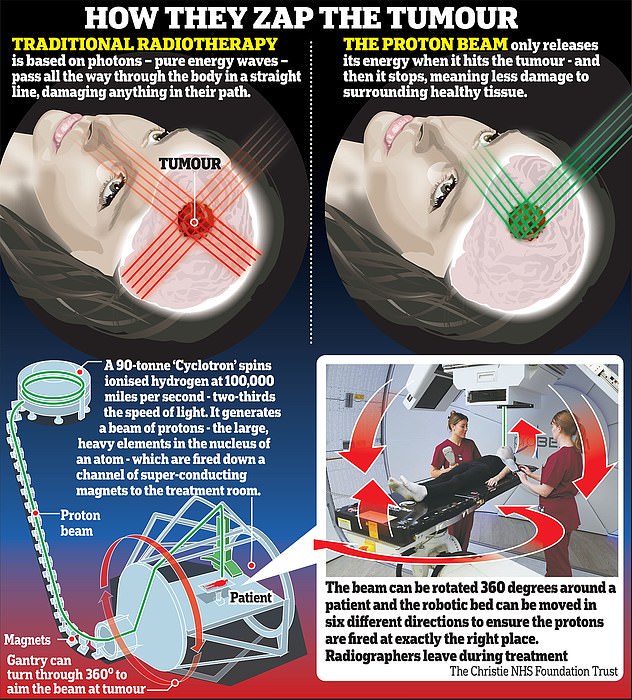
Proton beam therapy allows a dose of high energy protons to be precisely targeted at a tumour, reducing the damage to surrounding healthy tissue
Mr Moran said: ‘It’s gratifying to see UK oncologists becoming increasingly aware of proton therapy and embracing the treatment.
‘Our collaborative partnership with the NHS in Wales means that adult patients have an option to be treated closer to home.
‘Patient demand is increasing and it is encouraging that the UK is beginning to catch up with Europe in the provision of this therapy.’
The NHS has been paying for some patients to have the treatment abroad since 2008, at specialist centres in Jacksonville, Florida, and Oklahoma City in the US, as well as Switzerland, at a cost of around £110,000 per patient.
But now, the NHS opening its own centres, with the first at the Christie Hospital in Manchester last Autumn.
The first patient was treated in December last year, and by the time a second centre is opened in summer 2020, 750 patients will be treated every year.
Eventually, it is expected to benefit 1,500 patients a year.
Despite the a new NHS cancer treatment centres becoming operational, experts have said it will be a long time before more miracle recoveries are made.
Oncologist Jiri Kubes, medical director of the Proton Therapy Center (PTC), which treated Ashya King, said many patients in the UK will still be denied access to the treatment they want.
Dr Kubes said: ‘The demand for proton beam therapy is increasing year on year, with many patients seeking alternatives to the traditional cancer treatment pathways.
‘While the NHS acknowledges the benefits of PBT, and is building its own centres, they will still only be able to treat a fraction of those who might benefit from it, while many people will be turned down for the treatment because of the very limited indication criteria.
‘There’s still a long way to go before patients in the UK have widespread access to it.’
Because of this, growing numbers are willing to pay for the treatment abroad – in 2016, the PTC treated 21 patients from the UK and Ireland.
But by the end of last year, they’d treated 38 patients, each paying the minimum price of the shortest treatment schedule of around £23,000.
The main barrier for development of centres in the UK has been the enormous cost of the equipment. The NHS centres in Manchester and in London in 2020 are reported to have cost £250 million.
